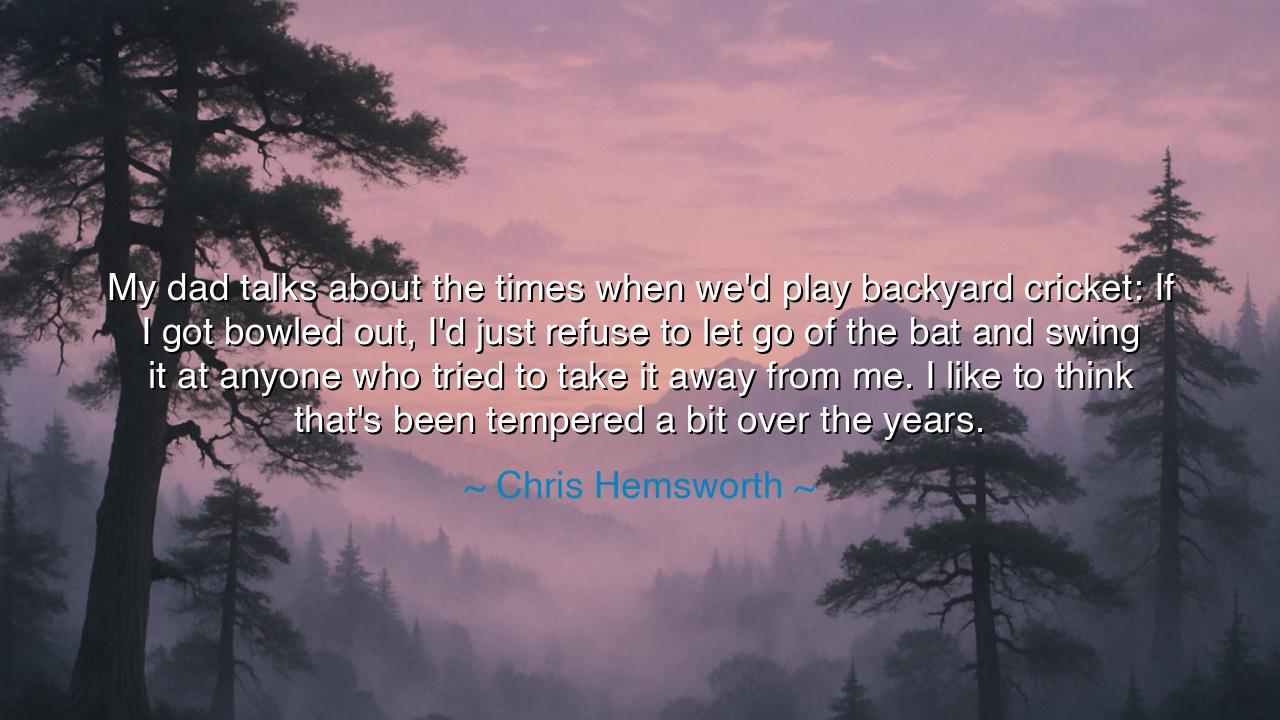
My dad talks about the times when we'd play backyard cricket: If
My dad talks about the times when we'd play backyard cricket: If I got bowled out, I'd just refuse to let go of the bat and swing it at anyone who tried to take it away from me. I like to think that's been tempered a bit over the years.






“My dad talks about the times when we’d play backyard cricket: If I got bowled out, I’d just refuse to let go of the bat and swing it at anyone who tried to take it away from me. I like to think that’s been tempered a bit over the years.”
Thus spoke Chris Hemsworth, recalling with humor and reflection a story from his youth. Yet beneath the laughter lies a truth about passion, temperament, and the process of maturity. His words remind us that the fire that drives greatness is often born in childhood — fierce, wild, unrefined — and that wisdom comes not from extinguishing that fire, but from learning to master it.
In this memory, Hemsworth paints the image of a child unwilling to surrender — a boy gripping the bat as if it were a sword, refusing defeat even when the game is lost. This stubbornness, though childish, is the seed of the determination that would later carry him through the struggles of an acting career. For every great achiever begins as someone who refuses to yield — someone who, when “bowled out,” dares to pick up the bat again. The ancients would have called this the spirit of areté — the relentless pursuit of excellence, born of courage and defiance. Yet Hemsworth’s final line — “I like to think that’s been tempered a bit over the years” — reveals the wisdom that comes only with time: that passion must be balanced by restraint, or it turns from strength to folly.
The origin of the quote is found not in grand philosophy, but in the hearth of family — a father telling stories, a son remembering the lessons buried in play. Yet, as in many things, the small moments of childhood mirror the great struggles of life. The backyard becomes the world; the cricket game, the human journey. To be bowled out is to fail; to clutch the bat is to resist the truth of defeat. All of us, at some point, have done the same — refused to let go of something we love, a dream, a pride, or an ambition. But the mark of growth is learning that letting go can be as powerful as holding on.
Passion, when young, is like a storm — raw, untamed, magnificent. It drives the heart to act, to strive, to conquer. Without it, there would be no heroes, no art, no progress. But as one matures, one learns that even storms must yield to rhythm and reason. The child who swings wildly in the backyard becomes the adult who channels his energy with purpose. This is what Hemsworth means when he says the impulse has been “tempered.” The fire that once raged without control has become the steady flame that lights a life of discipline, artistry, and humility.
History is rich with examples of this transformation. Alexander the Great, in his youth, was fierce and impulsive — a conqueror who sought glory in every battle. Yet as he matured, he began to understand the weight of power, learning to temper ambition with leadership. Similarly, the great samurai of Japan trained not only in combat but in meditation, poetry, and calligraphy, for they knew that the warrior who cannot master himself will one day fall to his own sword. In each of these lives, the lesson is the same: that greatness is not born of strength alone, but of self-mastery.
Hemsworth’s story, though told with humor, carries that same wisdom. It is a reflection not just on sport or childhood, but on the journey from instinct to intention — from raw will to conscious purpose. The boy who would not release the bat becomes the man who wields his craft with care. His youthful defiance was not a flaw but a forge — it shaped the tenacity that later allowed him to endure rejection, hardship, and fame itself. The difference is that now, the bat is no longer a weapon of pride, but a tool of creation.
Let this be the lesson: hold fast to your fire, but learn to guide it. Do not extinguish the passion that drives you, for it is the source of your strength — yet do not let it blind you to wisdom, humility, and grace. Know when to fight and when to yield, when to press on and when to step back. For in this balance lies the art of living well.
And so, as Chris Hemsworth reminds us, even the fiercest spirit can learn to temper itself — not by losing its flame, but by transforming it into light. The child who once swung the bat in stubbornness grows into the adult who lifts it with purpose. And that, truly, is the victory worth winning — not over others, but over oneself.






AAdministratorAdministrator
Welcome, honored guests. Please leave a comment, we will respond soon